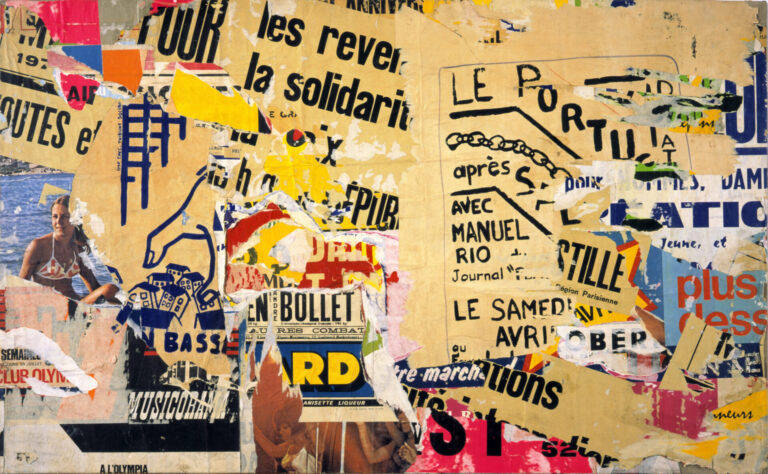Jacques VILLEGLÉ and the Streets of Paris
May 19 — Jul 1, 2022
Modernism is pleased to present its eighth in-depth survey of décollage works by Jacques VILLEGLÉ, one of France’s most influential contemporary artists. This exhibition also marks the release of our major new monograph: “Jacques Villeglé and the Streets of Paris” by Barnaby Conrad III, the first comprehensive book on Jacques Villeglé in English.
For over seventy years, Jacques VILLEGLÉ’s work has played an important role in redefining what constitutes a work of art. He is an artist who was instrumental in bringing the streetscape into the space of the exhibition.
Jacques Villeglé spent most of his life wandering the streets of Paris, pulling torn advertising posters off the ancient walls and pronouncing them Art. “In seizing a poster, I seize history,” he says. “What I gather is the reflection of an era.”
Born in Brittany in 1926, Villeglé was a seventeen-year-old architectural apprentice in Nantes during the bleak days of the German Occupation. After the Liberation in 1944, he moved to the City of Light, where he was drawn to filmmaking, avant-garde Lettrist poetry, and painting. The prewar art movements of Cubism and Surrealism had melted into abstraction, but Villeglé’s earnest attempts at Art Informel soon struck him as redundant, and he destroyed his canvases. Without a job and at loose ends intellectually, he became a flâneur, a curious intellectual roaming through war-scarred Paris. “As I walked through the streets, I was struck by the color and typography of the posters. In those days, the cinema and concert posters rarely had images—just words—and they had been torn and shredded to where they became something else, with a post-cubist look to them. I began to see them as paintings made by anonymous hands.”
In 1949, Villeglé and his then artistic collaborator, Raymond Hains (1926–2005), scavenged advertising from billboards on the grand boulevards, snatched political posters in the financial district, and pillaged Left Bank walls plastered with flyers for jazz concerts and art exhibitions. Mounting them on canvas, they presented a new kind of art. Between 1949 and 2003, Villeglé himself plucked more than 4,500 works from all twenty of Paris’s arrondissements, carefully labeling each with the exact date and street address of the heist, just as a lepidopterist might record the habitat of a newly captured butterfly. Each work became a unique time capsule of the ever-changing city.
Jacques VILLEGLÉ’s work has been exhibited extensively in the United States and Europe, and is the collections of many important museums worldwide (Museum of Modern Art, New York; Museum of Contemporary Art, Los Angeles; Detroit Institute of Arts; Centre Georges Pompidou, Paris; Tate Gallery, London; Moderna Museet, Stockholm; Musée d’Israël, Jerusalem). In the fall of 2008 a major retrospective of his works was exhibited at the Centre Georges Pompidou, Paris. In 2011 Modernism published the English translation of Villeglé’s theoretical writings Urbi et Orbi from 1959.
GALLERY HOURS: TUESDAY–SATURDAY 10AM–5:30PM
FOR FURTHER INFORMATION CALL: 415-541-0461
OR EMAIL: INFO@MODERNISMINC.COM
Check gallery website for hours and additional info
